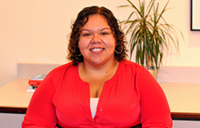By Jennifer Aponte and Gwendolin Bandi
As teacher leaders, we lead not only our classrooms but our profession. Our most recent opportunity to uplift teacher voice and influence change came at the U.S. Department of Education invitation to attend the 2015 International Summit on the Teaching Profession (ISTP). We traveled to Banff, Canada, as part of the official U.S. delegation to participate in an international exchange on our life's work. This year's theme was leadership, teacher recognition and efficacy, and innovation. What better?
At Customs, when asked why we were traveling, we said, "Business." This unassuming question and the very simple answer were invigorating. They reconfirmed for us that this work is very important and that we are key stakeholders. As current educators, we offer knowledge, insights, and perspectives that other stakeholders do not possess and are critical to ensuring effective educational change.
Despite a personal invitation from the U.S. Secretary of Education Arne Duncan, both of us were initially intimated by the experts in the room and hesitant to speak up. During the session on innovative technology, one of us screwed up the courage to raise a hand and ask about the role of teacher voice in the creation of the innovative Edusphere idea. Afterwards, a teacher from the Netherlands asked a follow-up question. At the end of the session, this educator walked over and said, "I did not know we could participate in these sessions. I thought it was just for the experts. When I heard you introduce yourself as a teacher, I felt confident to ask my question." How odd it is that teachers would be afraid to speak up at a conference centered on the teaching profession.
For the rest of the Summit, chief country delegates, secretaries and ministers of education, union leaders, and educational researchers sat at the discussion tables. All other delegates sat around the perimeter of the room or in an overflow room observing the proceedings. As teachers in attendance, we found ourselves in the observer seats.
Many policy makers described teachers as crucial components of change and progress. They spoke of empowering teachers with authority and shifting paradigms in the teaching profession. They discussed the idea of a shared vision and distributed leadership. One chief delegate shared, "Education is the key to productivity, and teachers are the key to better education systems."
As exciting as all this was, where were the teachers in these conversations? Many of us felt that we were invited because we actively lead in our schools, communities, and countries, and we expected to have a similar role at ISTP. We felt stifled in the exchange. At the recent 2015 Teaching and Learning Conference in Washington, D.C., Secretary Duncan said, "If there's a seat at the table, grab it. If there's no seat at the table, make your own table."
So, in true teacher form, we didn't give up. We set up our own "digital" table. We, and many of the other teachers from the different countries, took to Twitter throughout the Summit as a way to engage in the dialog. We created an ad-hoc session to gather the teachers present to discuss our observations and share our experiences. The impromptu teacher meeting was our favorite session. We left there with plans to continue this international teacher dialogue beyond the Summit, and to expand teacher voice at future gatherings.
The Summit concluded with each country making three commitments to work on in the next year. After we were denied the opportunity to have a teacher participate in the official Summit sessions, Secretary Duncan invited all U.S. teachers to contribute to our delegation's meeting to decide on these commitments. This move was unprecedented. We are excited about all three U.S. commitments (check out the U.S .commitments here), but especially the commitment dedicated to a National Summit modeled after ISTP. This was a teacher-born idea! The U.S. Department of Education and Secretary Duncan charged the teachers who attended with the task of planning this National Summit. This is our chance to address our concerns about inclusive collaboration. Through this National Summit, we aim to represent all education experts in important discussions about this work, including teachers. This experience showed us the power and importance of teacher voice.
We encourage all teachers to continue to make a seat at the table in decision-making at all levels. Nobody knows the experiences of students and classrooms better than the experts who lead in them every day.
Jennifer Aponte is a K1 Sheltered English Instruction (SEI) teacher at the David A. Ellis Elementary School in Roxbury, Massachusetts. Gwendolin Bandi is a fourth grade math teacher at the John J. Doran School in Fall River, Massachusetts. They are Teach Plus Teaching Policy Fellows.

